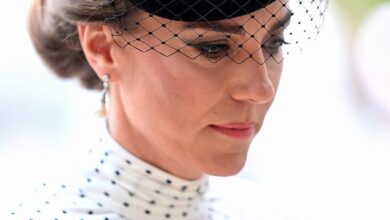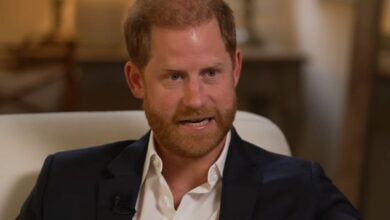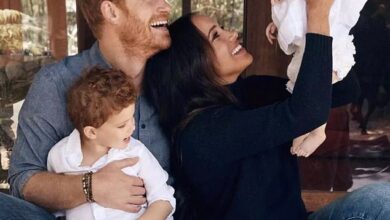As Prince Harry and Meghan launch campaign to tackle child safety online, parents whose children were harmed by social media share their tragic stories
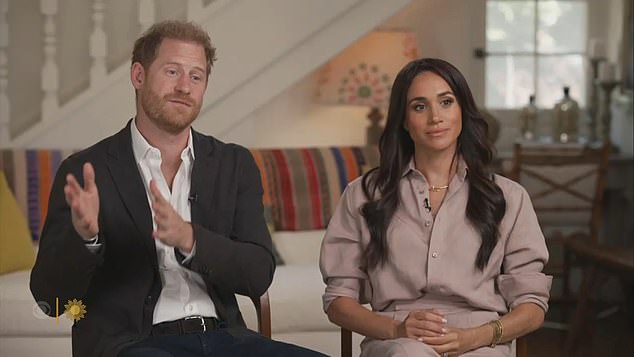
Prince Harry and his wife Meghan Markle have launched a new campaign aimed at tackling harm caused to children online.
Called The Parents’ Network, the initiative aims to help offer a ‘safe and supportive community [which] is available to all caregivers navigating the complex digital world’.
The Network already includes a group of parents. According to the Sussexes’ Archewell Foundation website, this group includes those who ‘have first-hand knowledge of the pain and destruction caused by social media use’.
A description of the network on the site says: ‘Each of us have been through something no parent should ever have to experience, and our mission is to prevent anyone else from suffering the way we have.
‘For anyone who has a child affected by social media harms, we are here to support you. Our safe and supportive community is available to all parents and caregivers navigating the complex digital world.’

Prince Harry and his wife Meghan Markle (pictured) have launched a new campaign called The Parents’ Network
The campaign, which carries the slogan #NoChildLostToSocialMedia, includes a video which has been posted on the Foundation’s website and features parents who have lost their children to suicide because of online harm.
In addition, a list of three guides has been posted on the site, each tackling a social media platform, including Instagram, Snapchat, and TikTok.
The guides are described by the site as being ‘repurposed in partnership with The Social Media Victims Law Center’.
Compiled using information from the Center’s online social media guides, they include information about what each platform is used for, and how caregivers can ‘improve their child’s safety’ while they are using them.
Alongside the campaign launch, the couple gave their first formal broadcast interview together in three years today, appearing on American broadcaster CBS News’ Sunday Morning programme.
During the sit down with anchor Jane Pauley, the couple said they want to ‘be a part of change for good’ when it comes to the ‘online space’.
The interview showed the couple meeting with members of The Parents’ Network in person for the launch, with future meetings set to take place online.
These are the parents who are featured in the campaign video shared today on the Archewell Foundation website. In the video, they shared they shared their heartbreaking stories of how their families were affected by social media.
Darla and Ryan
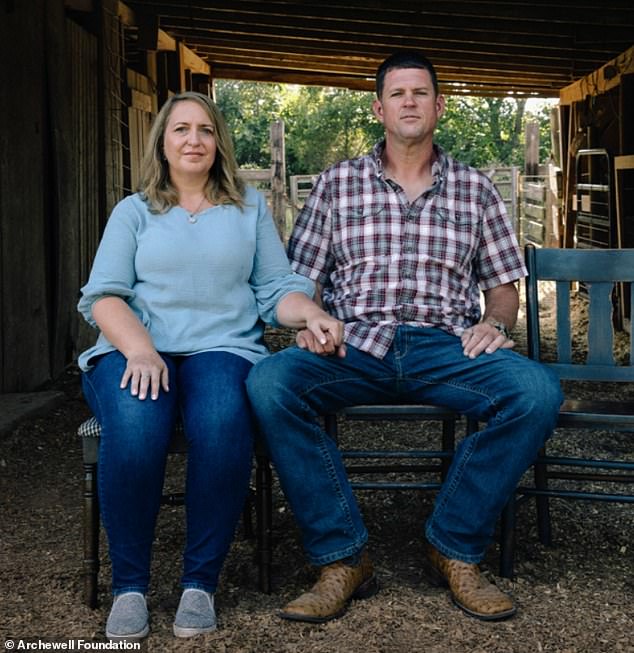
Darla and Ryan lost their firstborn Emma Claire to suicide after finding out she had been relentlessly bullied
Darla and Ryan’s firstborn child Emma Claire enjoyed spending time with her show pigs. She also loved basketball, photography, cheering for Alabama football and hunting with her father at the weekends.
According to the couple, their family was close: Emma Claire was a ‘happy and outgoing’ girl, even on her final day, and so they were never aware of the depression and darkness she was experiencing.
One Sunday, as they were getting ready for church, Darla found Emma Claire in their barn. As told by Darla to the Archewell Foundation’s website: ‘I saw her legs first and knew something was wrong. I hurried over to her, but it was too late. She had taken her own life.
‘I ran to Ryan. He thought he could fix it, you know. He was her dad. That’s what he did. He thought he could throw her in the truck and take her to ER.
‘But then reality set in. It was the worst day of our lives. We say our lives stopped that day.’
Darla and Ryan learnt that their daughter had been relentlessly bullied on Snapchat, a social media app where people can send captioned pictures to each other and messages that disappear after a certain time period.
‘Even though we checked her phone regularly, the messages that were causing her so much pain weren’t visible to us,’ Darla said.
Darla and Ryan said they knew where Emma Claire was at all times, knew what she was watching on TV and who her friends were, but said even this ‘wasn’t enough’.
They hope by sharing their daughter’s story, they can raise awareness, and prevent any other young people from suffering in the same way.
According to the couple: ‘It’s the most indescribable pain, the worst pain a human can feel, to lose a child. We wouldn’t wish it on anyone.’
Erin
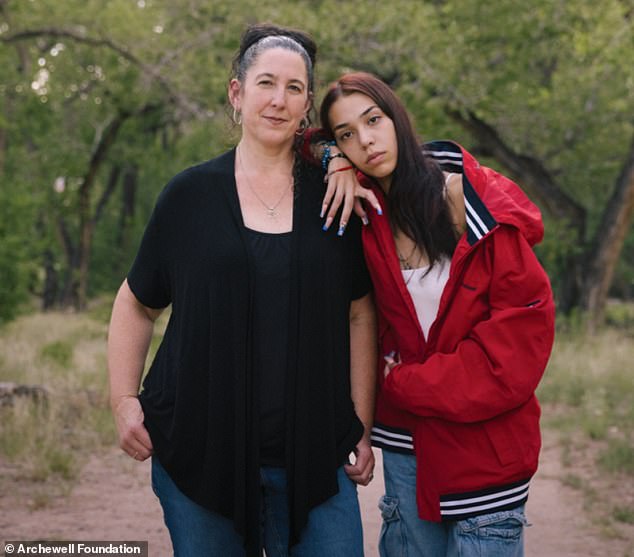
Erin described her daughter, Angelica (pictured), as happy, playful, carefree and curious, before social media impacted her life
Erin described her daughter Angelica as happy, playful, carefree and curious – before social media impacted her life.
Angelica got her first smartphone at the age of 12. At first, she used it to watch ‘funny animal videos and message friends’. But she started to engage with darker content, which ultimately drove a wedge between mother and daughter.
She asked her mother if she could start using Snapchat, and Erin then downloaded it to check out the features on the social media app herself.
According to Erin, all she could see was ‘light, entertaining videos,’ along with ‘funny filters’ – she had no idea the app could be so dangerous.
‘Angelica was being targeted with content about drugs – menus of all the pills she could get at the click of a button, sent via private messages sent by adults who did not know her,’ Erin said.
By the time Angelica was in the eighth grade, her attitude, style, music taste and who she spent her time with changed drastically.
Angelica showed signs of depression and ‘ran away several times’. Erin said her daughter knew how to bypass monitoring apps, and would not let her mother see her phone, and would instead show her a different phone.
When she was aged around 14 to 15, Angelica disappeared for five months. Then, Erin received a call that shook her to her very core.
A police officer phoned her and said: ‘Your daughter has overdosed’.
After this, Erin stripped everything back to basics and ensured that her daughter felt listened to and ‘gave her the freedom she needed without restriction’ to help rebuild her family.
She wrote on the charity’s website: ‘I used to wake up at 2am to make sure she was still breathing and still there.’
Erin said Angelica realised the toll that social media was having on her life but even now gets shown disturbing content.
‘Videos of naked men, of people shooting themselves in the head, colourful drug menus, images that invite eating disorders by promoting unhealthy body images, and even the unimaginable things like ads encouraging young teen girls to make money through surrogacy,’ she said.
But Angelica does not try and hide the thing she gets shown online anymore so they can talk about it openly.
Kathleen and Jeff
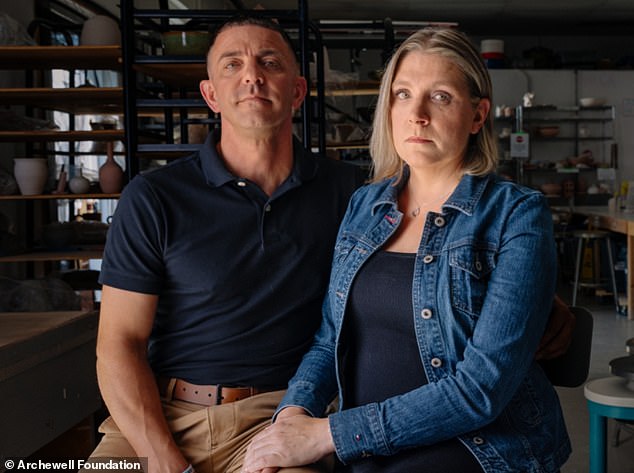
Kathleen and Jeff (pictured) say their daughter, Alexis, was ‘robbed of her childhood’ due to social media
Kathleen and Jeff say their daughter, Alexis, was ‘robbed of her childhood’ due to social media.
Her first phone was a flip phone and they gave it to her so they could keep in contact – for safety reasons.
But things changed when Alexis made an Instagram account in the sixth grade without telling her parents.
She was around 11 or 12-years-old when she began interacting with the app, which is in violation of their policy.
Alexis had posts pop-up on her feed that were marked #ProAna (which denotes pro-anorexia content) but Alexis not understand what this meant.
She thought Ana was a person, and wanted to see if ‘she’ was okay.
After engaging with a couple of posts, Alexis was then flooded with similar content, and this affected her badly.
Her parents said: ‘We started to notice that she was self-harming, running straight off to the bathroom after any meal, and she became extremely irritable.’
Kathleen and Jeff said their ‘hearts broke’ after they found out their daughter was struggling with an eating disorder and self-harm – harming her almost fatally in 2018.
‘The algorithms are designed to keep children specifically addicted, which can often lead them to dark and harmful places. This is a systemic issue that needs addressing,’ they said.
Now, Alexis has graduated university with her bachelor’s degree and works as an emergency medical technician.
She hopes to become a special education teacher ‘to use her experiences and compassion to help others’.
Joanne and Derek
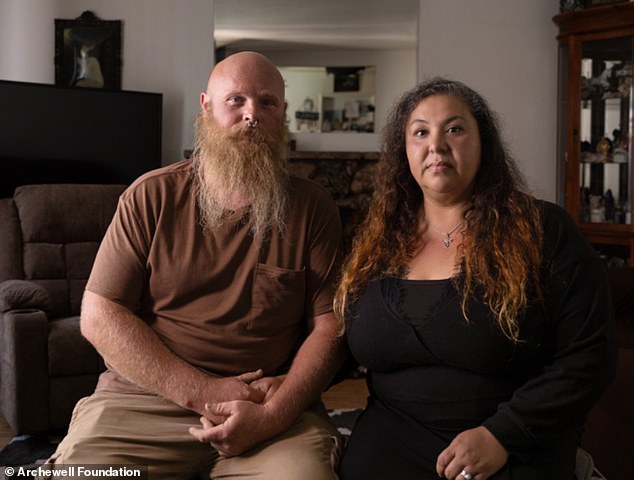
Joanne and Derek (pictured) felt like they were ‘in competition’ with social media apps for their son’s attention
Joanne and Derek gave their son Lucas a phone when he was around nine-years-old, but soon felt Lucas – who was described as a ‘happy ball of energy’ – slipping away from them.
They felt like they were ‘in competition’ with social media apps for their son’s attention. But they were losing the battle.
Joanne and Derek said: ‘A stupid challenge on social media had led to Lucas being attacked in the school bathrooms, and some inappropriate photos were shared on social media.’
They struggled to understand how content like that could get shared around online so easily ‘without any consequences’.
Since the attack, Lucas is slowly recovering but they admitted that it had a ‘massive impact’ on him.
Our children are puppets in these evil games, and platforms are doing nothing to stop them,’ they said.
Toney and Brandy
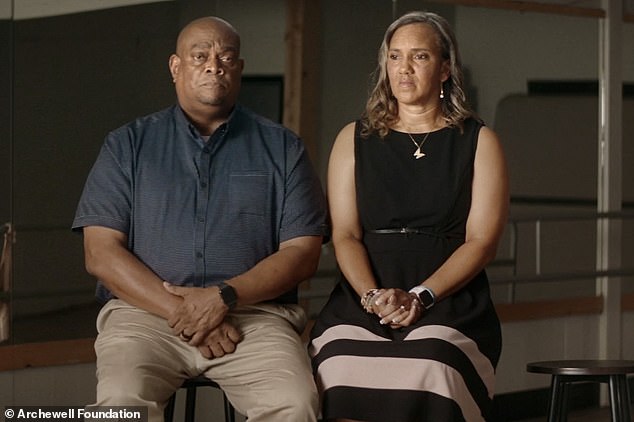
Toney and Brandy (pictured) who lost their daughter Englyn, want social media companies to make their platforms safer for children
Parents Toney and Brandy lost their daughter Englyn, the youngest of their eight children (five girls and three boys). According to the bereavd parents, they were ‘so close’ with their youngest that it isn’t possible for them to ‘ever get close to describing the amount of love and happiness we had’.
Describing their daughter, they said she loved fashion, and would change several times a day as she enjoyed her clothing so much. She also loved singing and dancing.
When she was around 12 or 13-years-old, she had a smartphone so she could stay connected with her parents. They knew she was using it to post fun pictures and videos, as Toney and Brandy said, they were ‘really simple, fun things that any young child would do’.
However, in retrospect, they say they now realise their daughter had become addicted to social media, and while they once thought it was for staying connected and having fun, they now realise how dangerous it can be.
Speaking about Englyn’s tragic death by suicide,Toney and Brandy said there were no signs. The day she died, she was laughing and dancing, behaving in her normal manner. She told her parents she loved them before going to bed.
After her death, her devastated parents found notes on Englyn’s phone, describing how depressed she was. They realised how her social media feeds were ‘sending her harmful content based on, what we assume to be, her searches about feeling down’.
Toney and Brandy want social media companies to make their platforms safer for children, describing their algorithms as doing harm that is ‘real’, and that they are ‘affecting too many families’. Their engagement in The Parents’ Network is to try and save others from going through the same lifelong grief as their family.
For confidential support in the UK, call the Samaritans on 116123 or visit www.samaritans.org for details; In the US call the National Suicide Prevention Lifeline at 1-800-273-TALK (1-800-273-8255).

